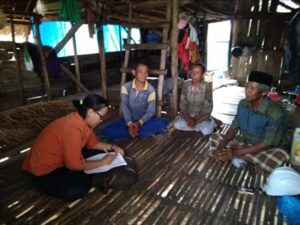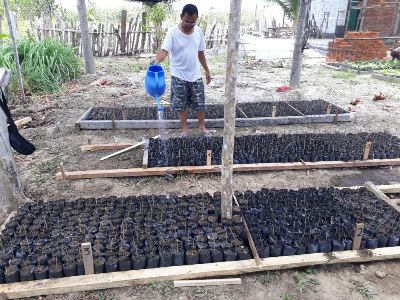The integration of social forestry, science and local community in the collaborative Muna teak (Tectona grandis) development
Author: Desmiwati, T O Veriasa, M Zanzibar, Y Bramasto, R U Damayanti, N Yuniarti and L R Wibowo
 Abstract: The demand for teak wood in Indonesia reached 7 million m3, however, only 10% can be produced. One of the best teak producers in Indonesia was Muna, Southeast Sulawesi which once has a golden period but now experiencing degradation and losing genetic resources. How to restore Muna teak and its genetic resource became the question of the research. This study uses descriptive qualitative research using data from interviews with relevant stakeholders and secondary data. The result of the study shows that the issuance of Business Permit for the Utilization of Timber Forest Product-in Community Forest for three Forest Farmer’s Cooperatives in 2017 on the area of 1,817 hectares through the Social Forestry scheme has made a positive contribution to the restoration of Muna teak forest. The management of the three cooperatives in partnership with a private company, and the government’s financial support by initiating a tissue culture laboratory and genetic engineering as an effort to propagate the Muna teak using mutation breeding techniques to obtain superior clones. Through multi parties, involvement, and support, the integration of government policies and science, in synergy with individual effort and local community movement, effort indicates a hope to restore Muna teak.
Abstract: The demand for teak wood in Indonesia reached 7 million m3, however, only 10% can be produced. One of the best teak producers in Indonesia was Muna, Southeast Sulawesi which once has a golden period but now experiencing degradation and losing genetic resources. How to restore Muna teak and its genetic resource became the question of the research. This study uses descriptive qualitative research using data from interviews with relevant stakeholders and secondary data. The result of the study shows that the issuance of Business Permit for the Utilization of Timber Forest Product-in Community Forest for three Forest Farmer’s Cooperatives in 2017 on the area of 1,817 hectares through the Social Forestry scheme has made a positive contribution to the restoration of Muna teak forest. The management of the three cooperatives in partnership with a private company, and the government’s financial support by initiating a tissue culture laboratory and genetic engineering as an effort to propagate the Muna teak using mutation breeding techniques to obtain superior clones. Through multi parties, involvement, and support, the integration of government policies and science, in synergy with individual effort and local community movement, effort indicates a hope to restore Muna teak.
Keywords: Muna teak, social forestry, mutation breeding, tissue culture, forest farmer cooperatives
URL: https://iopscience.iop.org/article/10.1088/1755-1315/917/1/012003

 Indonesia
Indonesia